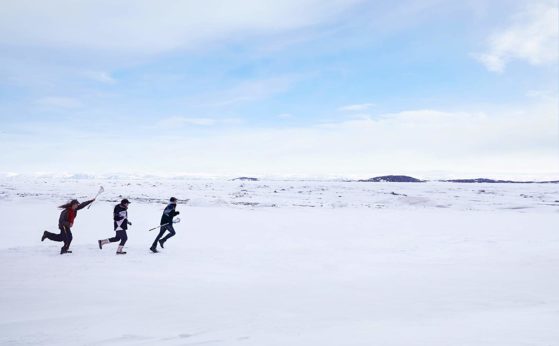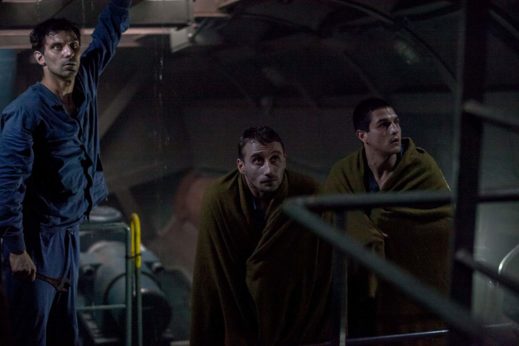
TORONTO—The Toronto International Film Festival (TIFF) is one of the largest and most prestigious film festivals in the Western hemisphere. Wading through its roster of over 350 titles is a daunting task. In addition to the impressive films that have been reviewed so far, here are some further titles that also deserve attention by the discerning progressive viewer.
Actor Ben Schnetzer has offered impressive performances in several films of social significance. He played among others, a Northern Irish gay rights activist in Pride, and a vital role in Oliver Stone’s Snowden. He reached a peak in his lead role in The Journey is the Destination, where he gave meaning and life to the young photojournalist, Dan Eldon, who traveled the world wide but met an untimely death at the age of 22. It’s a film of enormous humanity and love for peoples of the world.

Schnetzer continues his excellent characterizations in another true story, The Grizzlies, about a young idealist teacher confronting reality. Canadian Russ Sheppard, with no previous experience, moves far north to land a high school job teaching in a small Inuit town. He soon discovers the Native community has the highest suicide rate in the world: The youth there have no money, jobs or future. There is much bitterness as the locals try to survive on what the white man has left them. So when a white teacher comes to teach them about their history there is a total lack of trust and respect. What seems to be an impossible situation eventually works itself out as Sheppard, after many failed attempts to communicate, decides to teach them the game of lacrosse, an original Native game that none of the students knew about or ever wanted to play. This is an emotionally heartwarming story that says much about racism in a moving uplifting manner. It shows not only how sports can provide a positive social function, but also the importance of “walking a mile in my shoes.” Sheppard, who also wrote the screenplay, certainly discovered how empathy and an understanding of people’s culture can help motivate people for social change. It’s a tribute to Inuit youth and draws focus on a much neglected subject.
An American film released a while ago entitled Monsters and Men has received many accolades. It’s one of the more compelling of many films dealing with police violence in America and is a highly effective drama. It shows the complexities of race interactions and refuses to address them in only black and white terms. There are several parallel and intermingling stories, illustrating how an entire community can be affected by one small but critical incident. A young man films a police shooting on his cellphone camera and is troubled whether he should release it to the public and risk his family getting targeted. A young Black cop who faces racial profiling regularly, is constantly under pressure from his fellow officers to overlook the crimes of a known white racist cop. Another theme follows a young man named Zyrick who is constantly being stopped by this racist cop and fears possible violence. In the meantime his father is helping to get a basketball scholarship for his son so he can move of town to safety. The traumatic effects of racism are seen everywhere in the community. The activist angle in the movie is supplied by a young woman who involves Zyrick in an anti-racist campaign. Moved by the committed activists, Zyrick is infused with determination to stop these racial crimes. Faced with teargas and police violence at protest rallies, he marches on and discovers the fight for justice is not easy, but necessary.
And two films about post-Soviet Russia
Russian director Yury Bykov has made films criticizing the current state of affairs in a country where the leader has been under fierce attack from Western powers. His 2014 film called The Fool is a biting indictment of the failing infrastructure in formerly functional industrial cities of the USSR. A large housing complex suffers a crack in the foundation as tenants are forced to remain in the dangerous structure, because there is nowhere else to move to. After emergency pleas, local bureaucrats eventually address the problem, but because of longstanding governmental corruption and lack of funds, nothing is done. You have to imagine what happens next.
In Bykov’s newest film, The Factory, his target is the criminal mafia oligarchies who have privatized much of the former Soviet industries. In a dilapidated industrial building, now owned by capitalists instead of workers, the employees are given notice that the company is filing bankruptcy and they’re all out of work, effective immediately. There are many methods they could use to deal with this situation, but the one they choose, to their extreme disadvantage, is to kidnap the owner and ask for ransom money. Led by a mysterious brooding Robin Hood-type leader, they get deeper and deeper into an irreversible mess, as the oligarch’s private police surround the building. The state’s SWAT police enter the scene as they confront not only the hostage takers but the oligarch’s criminal police force, too. Then, for protection, the workers call the media in to document the happenings, only to find that the media isn’t necessarily on the workers’ side. The lives of the workers are explored as they remain trapped in the building under siege, and as chaos and violence escalate throughout this unbelievable telling of the class struggle. Bykov is a great storyteller, and the film grabs you from beginning to end as this social critique confronts issues that are even hot today—and coming to your community!

Another film certainly not endorsed by the Russian government tells of the tragic sinking and explosion of a submarine in the Barents Sea in August of 2000. Belgian director Thomas Vinterberg was one of the founders of the famed Dogme 95 movement that attempted to bring filmmaking back to a more sensible and simplistic form by restricting special effects, costly gear and post-production. His newest film, Kursk, is far from that. In the nail-biting, fast-paced manner associated with Hollywood action films, it tells the story of the desperate attempts to save the nuclear-powered cruise-missile submarine and its 118 crew members, with help being offered by Britain, France and Norway.
But help was rejected. First, because the Russians didn’t want the West to learn of their nuclear powered military secrets. Second, it was an embarrassment that the unsinkable flagship of the Russian fleet with the best of the Northern fleet sailors aboard, sank to the bottom of the sea. Thirdly, the economy, infrastructure and military equipment were sadly in ill repair by that time. Nine years after the fall of the Soviet Union the Russian economy was in shambles, cannibalized by monied oligarchs and Western imperialists eager to profit from resources that weren’t available to them during the socialist days. The drama is structured around letters written by sailors onboard the fated ship pleading for a rescue ship. Max von Sydow plays the nasty Russian general who forestalls the inevitable help needed from the Brits, and who treats the sailors’ traumatized families with disdain.












Comments